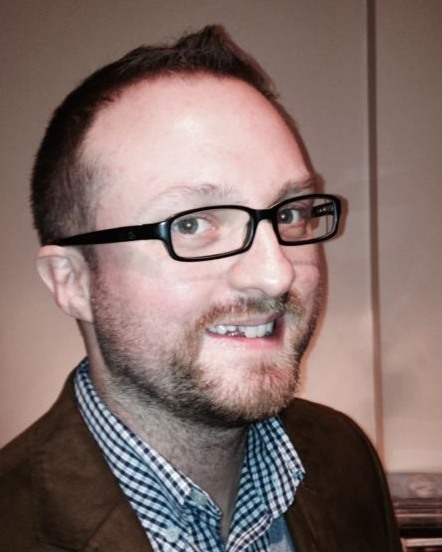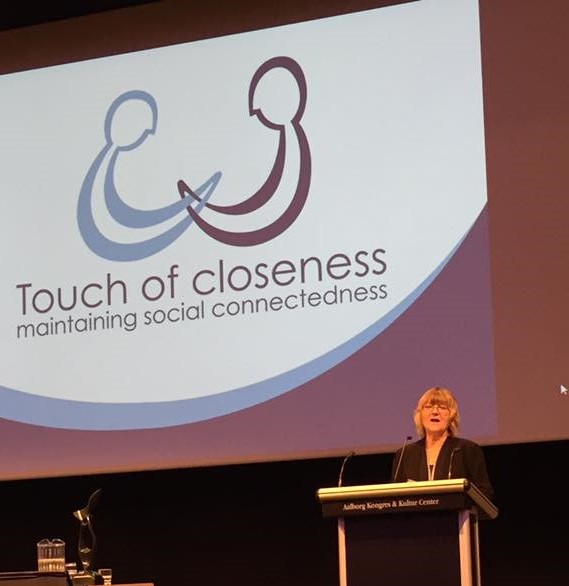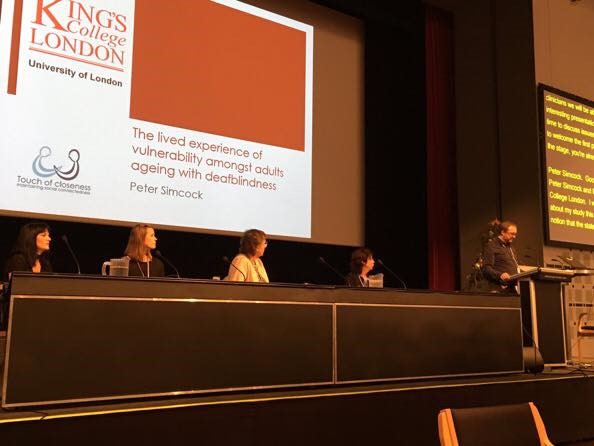 Peter Simcock is Senior Lecturer in Social Work (Adults) at Staffordshire University, and PhD Student, Social Care Workforce Research Unit, King’s College London. He reports from Touch of Closeness: The 9th Deafblind International European Conference, Aalborg. (621 words)
Peter Simcock is Senior Lecturer in Social Work (Adults) at Staffordshire University, and PhD Student, Social Care Workforce Research Unit, King’s College London. He reports from Touch of Closeness: The 9th Deafblind International European Conference, Aalborg. (621 words)
Having been inspired at the 16th Deafblind International (DbI) World Conference in Bucharest in 2015, I was delighted to present at the 9th Deafblind International European Conference, in the lovely city of Aalborg, at the beginning of September 2017. Linda Erikson, pedagogue at the National Resource Centre for Deafblindness in Sweden and herself deafblind, observes that the sense of touch is crucial for all deafblind people. It was therefore fitting that the Conference adopted ‘Touch of Closeness: Maintaining Social Connectedness’ as its theme.
Following a welcome reception, the conference was opened by Lars Søbye, Principal of the Aalborg Centre for Deafblindness and Hearing Loss, who welcomed participants from 32 different countries. Mai Mercado, Minister for Children and Social Affairs in Denmark, Ulla Astman, Chair of the Regional Council in the North Denmark Region, and Jude Nicholas, Clinical Neuropsychologist and Chair of the Scientific Committee also addressed the delegates. Presentations were interpreted into sign languages in both the visual and tactile modalities, and with no hard copies of the programme but rather a ‘conference app’, the President of DbI, Gillian Morbey, joked that the Conference had brought DbI into the 21st Century.
The plenary speeches explored the three conference sub-topics: Social Connectedness; Closeness; and Touch. I particularly enjoyed Dr. Alberto Gallace’s (University of Milano-Bicocca, Italy) plenary entitled ‘Touch and Body: tactile awareness and the science of interpersonal touch’. Dr. Gallace highlighted that while touch is directly linked to our emotional well-being, it is under-investigated in comparison to the range of studies dedicated to other sensory modalities. Drawing on his own pioneering neuropsychological research, Dr. Gallace emphasized the complex nature of touch and its importance for our social interactions. This theme was echoed in Prof. J.P. Slaets (University Medical Centre, Groningen) plenary, as he noted the profound desire we all have to be touched not as an object, but as a living and feeling person; this desire remains throughout the lifespan.
The plenary speeches were interweaved with presentations offering personal perspectives on living with deafblindness. Machteld Cossee from The Netherlands described how her invisible ‘disorder’ (Usher Syndrome) makes her invisible and impacts not only on her sight and hearing, but also her energy. Her presentation was followed by a screening of ‘The Small World of Machteld Cossee’, a documentary produced by filmmakers who followed her life for five years. Dr. Sanja Tarczay, the first deafblind person in Croatia to gain a PhD, and current President of the European Deafblind Union (EDbU), explained the important work of EDbU in securing equality and full participation in society by deafblind people throughout Europe.
The Scientific Committee designed a programme that explored how the commonalities between congenital and acquired deafblindness are illuminated. A range of workshops led by deafblind people, practitioners and researchers explored such themes as accessibility and participation, rehabilitation and coping strategies, relationships and communication, and family support needs. My own presentation, on the emerging findings from my PhD studies, formed part of a research symposium put together by Dr. Hans-Erik Frölander (Örebro University, Sweden) and Prof. Marleen Janssen (University of Groningen, The Netherlands). The symposium took the form of a series of 16 short TED-talks, showcasing current research in the field, and was well received by the academic and practitioner delegates attending.
Observing the use of a range of languages and communication methods and the connections and collegiality among participants, I certainly experienced the touch of closeness during the conference. I was also reminded of the important lessons about being human that we can all learn from those living with deafblindness. I look forward to the next Deafblind International World Conference in Australia, in 2019!
Peter Simcock is Senior Lecturer in Social Work (Adults) at Staffordshire University, and PhD Student, Social Care Workforce Research Unit, King’s College London.

